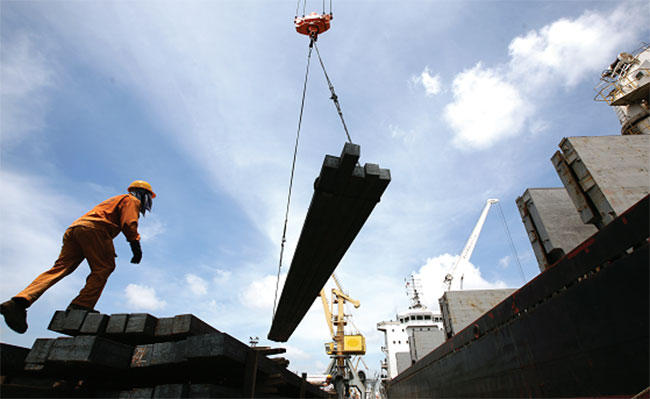Vietnamese steel industry divided over import tariff proposal

On December 26, the MoIT issued a decision to investigate steel ingots and steel bars imported to Vietnam, following a proposal by four companies, namely Hoa Phat, Vietnam Steel Corporation subsidiary Southern Steel Company, Thai Nguyen Iron and Steel Joint Stock Corporation, and Vietnam-Italy Steel.
The proposed Period of Investigation is from January 1, 2012 to September 30, 2015. The investigation will be carried out within six months and an official decision will be delivered soon after.
The four companies proposed raising the import tariff to 45 per cent on steel ingots and to 33 per cent on steel bars. They also proposed that the ministry apply these tariffs temporarily in 200 days before issuing its official decision.
These four companies currently account for 38.6 per cent of the country’s steel ingot and 34.2 per cent of steel bar output. These percentages meet the criteria for them to propose the investigation, with the minimum being 25 per cent, according to chapter 10 of Ordinance 42/2002/PL-UBTVQH10 on trade defence.
The reason, according to the four companies, is the remarkable increase in import of these products. Specifically, the import of steel ingots rose from 466,817 tonnes in 2012 to 1.5 million tonnes in 2015, while that of steel bars rose from 387,470 to 1.215 million tonnes during the same period.
The companies argued that they were forced to reduce the capacity of their production lines to 40-50 per cent for steel ingot and 50-55 per cent for steel bars. They also claimed to see a big decrease in market share, and that inventories increased remarkably over the period. Specifically, in 2015 inventories were 70 per cent higher than in 2014. Also, profits decreased sharply.
Some companies opposed the decision. Two weeks after the ministry issued its decision to investigate, Pomina, Vinausteel, Nasteel Vina, Thep Uc, Vinakyoei, Vietnam Germany Steel Joint Stock Company, and BCH JSC petitioned the prime minister, the MoIT, the MoF, the VSA, and the Competition Authority, not to apply the tariff on steel ingot.
They said the import volume of steel ingot in the 2008-2010 period was even higher than the 1.25 million tonnes in 2015.
Moreover, the steel sector has been operating below capacity in the production of all types of steel products, from steel ingots through steel pipes to construction steel, because many provinces want to house a steel factory and companies have built factories with an overall capacity of two or three times the aggregate demand. Many production lines use old technologies, productivity is lacking, and the management capacity is low, making the products not competitive.
They said that the handful domestic steel ingot producers are going to benefit, while the rest of the sector will lose out on the proposed change. If the tariff, 9 per cent as of the end of 2015, rises to 45 per cent, the price of domestic steel ingot is going to rise dramatically, and all steel producers in Vietnam will depend on these few companies. A representative from this side of the argument stated that the change is geared towards creating unfair competition.
“Many steel companies in Vietnam still have to import steel ingot because the products of domestic companies are not enough and are not of consistent quality. The tariff is going to cause a rise in the price of steel products and consumers are going to suffer,” the representative said.
What the stars mean:
★ Poor ★ ★ Promising ★★★ Good ★★★★ Very good ★★★★★ Exceptional
Latest News
More News
- First members of Danang International Finance Centre revealed (December 22, 2025 | 17:39)
- Human-centred governance seen as key to AI development (December 19, 2025 | 18:19)
- Top 10 notable events of Vietnam’s industry and trade sector in 2025 (December 19, 2025 | 14:00)
- Tungsten surges to 12-year high as world enters a new 'black gold' race (December 18, 2025 | 17:27)
- Vietnam’s coffee exports set new record despite price pressures (December 18, 2025 | 17:13)
- Garment and textile sector seeks new growth after volatile year (December 18, 2025 | 17:01)
- VinSpeed and Siemens strengthen cooperation for high-speed rail development (December 18, 2025 | 16:53)
- High-tech adoption for TH true MILK (December 18, 2025 | 13:39)
- Takeda supports health resilience amid climate change challenges (December 18, 2025 | 12:39)
- Mondelez Kinh Do - a chapter of purpose-led leadership in Vietnam (December 18, 2025 | 09:44)


















 Mobile Version
Mobile Version